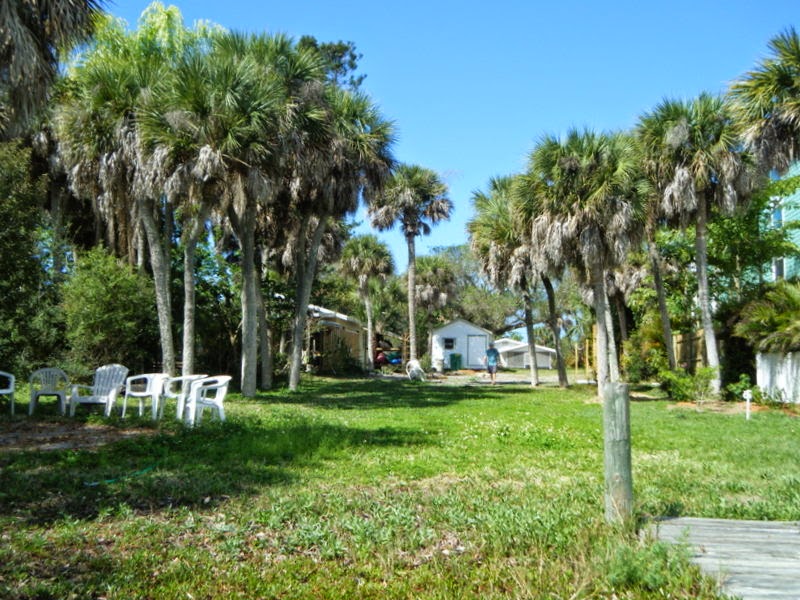It's a rare opportunity to attend an on-site Botany lecture by a retired professor! It's even more rare to commute to class in a kayak.....but that is exactly what the Charlotte Harbor Florida Sierra Club did at a recent outing.
A flotilla of 14 boats launched from Blind Pass Beach Park on Manasota Key for a 2 1/2 mile paddle south along Lemon Bay to the home of retired professor emeritus from Penn State, Dr Bill Dunson, who led the group through a walking lecture on gardening for wildlife.
Group leaders Charlie Woodruff (L) and Allaine Hale (R) who is the Greater Charlotte Harbor Sierra Club outings chairman.
Paddling through Lemon Bay's Aquatic Preserve, we saw dolphins, an eagle, cormorants and red breasted mergansers!
Charlie, an accomplished birder and paddler, led the way through the mangroves to Dr Bill's Botanical Garden.
The hour and fifteen minute commute to class.
Parking was, as usual for a university lecture, at a premium!
Below is Dr Dunson's home. Notice the natural setting between some new construction to the north (finished now....another waterfront McMansion) and to the south a typical home with lawn and a few palms.
McMansion
McMansion
Want to know all about waterfront building in SW Florida?
What a peaceful and relaxing place to spend the winter in Florida.
Dr Bill provided a list of species in his yard and told us his criteria for plant selection when creating a natural and "critter friendly" environment. Plants should provide one or more....
Cover
Food for wildlife via nectar, fruit and larval food
Nesting or breeding space
No overwatering
No chemicals
Though we could only focus on a few interesting or favorite species, the Dunson list totaled an incredible 165 species, with 79 natives and 86 exotics. WOW!
Sea Oxeye Daisy ( Borrichia frutescens), which is a great bee, butterfly and bird attractor and is salt tolerant (halophilic) and a great choice near the water. This got everyone thinking about "zones" in their yard......special spots with both advantages and disadvantages for different species.
Sea Oxeye Daisy
Queen Palms (Syagrus romanzoffiana) the way nature intended. Most often over-trimmed by aggressive landscapers....when left alone their fruits provide food for birds and small mammals...and the pruned fronds when left on the tree make an ideal breeding place for snails and caterpillars.
This is what a landscaper with a chain saw will do....not much good for wildlife!
Queen Palm wiki link
My favorite of the day.....Sensitive Plant (Mimosa pudica), which is a fast spreading ground cover. They are a "nitrogen fixing" legume, thus grow well without added fertilizer and are good for the soil. With my added interest in Ethnobotany I also learned, when I looked it up, that an extract made from the roots kills roundworm larvae and neutralizes venom of the Spectacle Cobra!
Mimosa pudica link
Wikipedia says that Mimosa is "shade tolerant," but Dr Bill said "no".....so I looked at several more sites, which say "full sun." Guess Wikipedia isn't always the best source!
Nitrogen fixing in plants
Good for wildlife.....well, good for the bacterium in the soil and healthy soil is the first step in healthy trophic levels
Every garden should have a water source for critters. Dr Bill showed us his birdbath drip system.....a more natural way to attract birds.
Birdbath Drip Systems
Popcorn Senna
Cloudless Sulfur link
You can follow Dr Bill on his "Nature Notes" blog seen on The Lemon Bay Conservancy's website
Food for both man and wild things.....a Black Mulberry Tree (Morus nigra). Great addition to a garden.....gotta' have one!
 |
| Bill Dunson photo |
Dr Bill talked about "invasives" and how they are often not the villain of the garden and provide something useful.....habitat, food, larval food, etc..
Are all Invasive Species bad?
Primary predator at the Dunson Botanical Garden seems to be this Brown Anole (Anolis sagrei).
Brown Anole link
My rule of thumb is to always end a botanical walk with an orchid! Here is a Crucifix Orchid (Epidendrum secundum), a very attractive undocumented immigrant from South America.
Bidding the class goodbye and a pleasant paddle home!
Time to paddle, enjoy the day and reflect on all I learned. Thanks so much to the Sierra Club for a unique outing...and thanks to Dr Bill for sharing his knowledge.
A quote came to mind from a text I read and kept.....
"A considerable number of professional scientists, as well as highly motivated amateurs, are engaged in ecological observations that have nonconsumptive value. While these scientific activities provide economic benefits...THEIR REAL VALUE LIES IN THEIR ABILITY TO INCREASE HUMAN KNOWLEDGE, ENHANCE EDUCATION, AND ENRICH THE HUMAN EXPERIENCE."
Looking forward to many more outings with the Sierra Club and many more days on the waters of SW Florida.



























cool stuff. interesting array of info. really like the Anole shot!
ReplyDelete